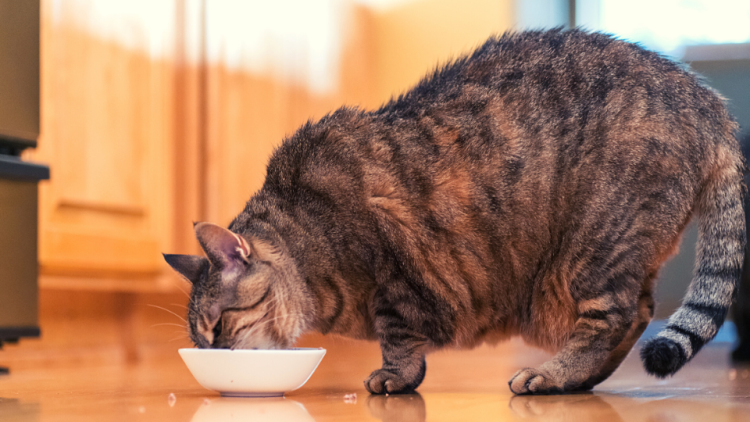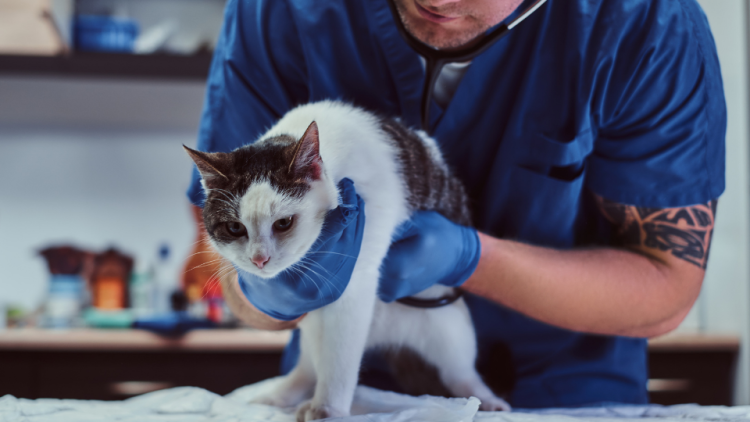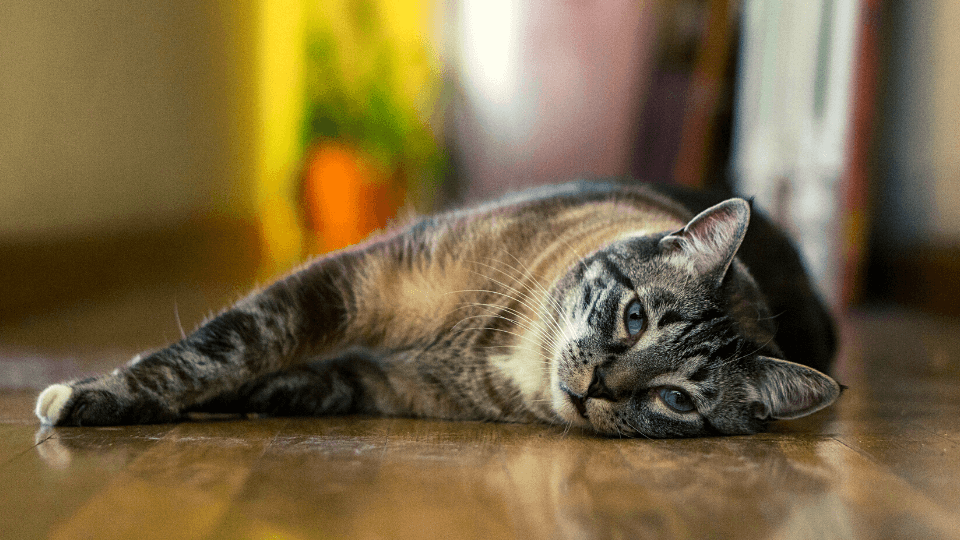Although pancreatitis in cats is rare, the condition can be life-threatening. Owners should know how to recognize the clinical signs so they can get their pet essential medical care if necessary.
In this article, we'll cover details including the causes, symptoms, and treatment of pancreatitis in cats so you'll be fully informed on the condition.
Table of Contents:
- What is pancreatitis?
- What causes pancreatitis in cats?
- What are the symptoms of pancreatitis in cats?
- How to diagnose cats with pancreatitis
- How to treat pancreatitis in cats
- What is the recovery time for cats with pancreatits?
- What to feed a cat with pancreatitis?
- How to prevent pancreatitis in cats
- Key Takeaways
Pro Tip: When you bring a cat into your home, you are gaining a new family member. But caring for your pet, especially when they’re injured or sick, can quickly get expensive. Many pet parents turn to pet insurance to help reduce the costs of veterinary care. It should be noted, though, that pet insurance doesn’t cover pre-existing conditions, so be sure to enroll your cat as soon as possible while they're young and healthy.
What is pancreatitis?
The pancreas is a small but very important organ located in the cat’s abdomen. It produces enzymes that aid digestive processes and hormones like insulin, which regulates glucose and sugar metabolism.
When the pancreas organ becomes inflamed, the condition is called pancreatitis. In cats, the condition is usually accompanied by inflammation of the intestine or liver, since these organs are so close to the pancreas. This inflammatory response across multiple organs, also known as “triaditis”, occurs because the inflammation causes the pancreatic tissue to leak digestive enzymes into the abdominal cavity.
The condition can be acute and take an edematous (mild) form or a hemorrhagic (more severe) form. Some felines that recover from an acute pancreatitis episode might develop chronic pancreatitis. In the case of chronic pancreatitis, the animal will suffer from recurrent bouts of the disease over time. With each occurrence, there will be gradual scarring of the pancreatic tissue, which can eventually affect the organ’s ability to function
What causes pancreatitis in cats?
In cats with a healthy pancreas, digestive enzymes are activated when they reach the small intestine. But when the animal suffers from pancreatitis, the pancreatic enzymes become activated while they’re still in the pancreas. This means that the enzymes start digesting before they should, resulting in the digestion of the organ itself.
Pancreatitis in cats seems to occur spontaneously, but there are several triggers believed to cause inflammation of the pancreas, including:
- Certain diseases, such as diabetes
- Infections
- Medications
- Metabolic disorders
- Trauma to the abdomen
- Abdominal surgery
The role of diet in the etiology of feline pancreatitis is unclear, but anecdotal evidence suggests that chronic pancreatitis develops in some cats that are fed diets high in fat or low-carbohydrate diets.

What are the symptoms of pancreatitis in cats?
The symptoms of pancreatitis are often variable, and their intensity depends on the extent of organ involvement. The condition affects all cats, regardless of their age, sex, and breed, but felines with certain conditions, like diabetes, might be more at risk.
The following symptoms can indicate that your feline friend has pancreatitis.
- Nausea
- Vomiting
- Diarrhea
- Dehydration
- Fever
- Loss of appetite
- Jaundice
- Lethargy
- Depression
- Increased heart rate
- Difficulty breathing
- Swelling, tenderness, and pain in the abdomen
If the attack is severe, bleeding, acute shock, or even death might occur.
Some of these clinical signs can be caused by other things, like exposure to harmful substances or intestinal obstruction. However, even vague symptoms like loss of appetite and lethargy should be enough for you and your feline companion to visit the vet. The earlier the treatment starts, the better your pet's prognosis will be.
How to diagnose cats with pancreatitis
Treating feline pancreatitis requires thorough testing and examination first as** the symptoms resemble a number of other medical conditions. Your vet will probably start by asking you about the symptoms your cat is showing and gather information about the animal’s medical history. They will also perform a physical examination, an ultrasound, and conduct a blood test. The vet might also recommend x-rays in order to rule out other conditions.
Routine lab tests usually reveal a number of changes, such as an increased white blood cell count, but these changes might also result from other illnesses. If the pancreatic enzymes in the blood are elevated, the diagnosis is confirmed, but many felines suffering from the condition will have normal enzyme levels.
The definitive diagnostic test for pancreatitis is called Feline Pancreatic Lipase Immunoreactivity, or fPLI, and measures pancreas-specific lipase. A pancreas-specific lipase is a lipase produced only in the pancreas, so the blood values will increase only when there’s pancreatic inflammation. This test requires only a simple blood sample and is very reliable for diagnosing the condition in felines with moderate and severe pancreatitis.
Another reliable way to make a definitive diagnosis is a biopsy. However, depending on your cat’s age and condition, your vet might not recommend a biopsy as it is an invasive procedure.

How to treat pancreatitis in cats
There’s no cure for pancreatitis in cats, but there are treatments that can help relieve symptoms and manage the disease.
In the case of mild pancreatitis, treatment is mostly supportive. The aim is to ‘rest’ or ‘turn off’ the pancreas by withholding all food and oral fluids. This way, the organ won’t be required to secrete any enzymes that might cause further injury to itself or adjacent organs.
Initially, a feline with pancreatitis might need to be hospitalized in order to receive stabilizing treatments, like IV fluids to maintain normal electrolyte and fluid balance. If the animal is unable to eat, a feeding tube will also be required. Medications for nausea, inflammation, and pain might be prescribed, as well as antibiotics if an infection is also suspected.
Most felines stay in the hospital for about two to four days. However, in the case of hemorrhagic pancreatitis, or if the animal is experiencing systemic shock, more aggressive treatment will be required in order to counteract shock.
The cost to treat pancreatitis in cats varies according to your location and the severity of the condition but typically ranges from $400 to $1,500.
Pro Tip: Knowing that you have a pet insurance policy can help take the monetary stress that comes with the ICU vet bills off of your mind. You will be able to focus on your cat’s care rather than how you are going to pay for their treatment.
What is the recovery time for cats with pancreatitis?
The prognosis for felines with pancreatitis varies depending on the animal’s overall health and the severity of the condition. Some pets recover completely and have no long-term effects, whereas other cats (usually those who experienced a worse case of the disease) will need ongoing care such as chronic medication administration and a permanent diet change.
Cases of chronic pancreatitis may recur for years, and the symptoms might flare up in response to stress, in which case, the cat’s medications might need to be adjusted.
If your feline friend is experiencing a flare-up, get in touch with your vet right away. Do not give your pet any drugs unless recommended by your vet, Human pain-relievers and drugs, including Advil and Aspirin, can be very toxic to cats.
What to feed a cat with pancreatitis?
Most veterinarians recommend feeding your cat as soon as they return home if they have an appetite and aren’t vomiting. If your pet is vomiting frequently, your veterinarian will discuss alternative ways to reintroduce food.
While your cat is recovering, it is important to give them food that’s easy to digest. If your feline companion has trouble eating, your veterinarian might prescribe antiemetic medications that control vomiting and reduce nausea.
Some cats with pancreatitis can't eat on their own and might need a feeding tube. If this is the case with your cat, your veterinarian will explain what options you have and how to administer medications, food, and liquids through the tube.
How to prevent pancreatitis in cats
While you can’t completely prevent feline pancreatitis, there are some steps you can take to reduce the risk or avoid future flare-ups.
The most important thing is to prevent your cat from becoming obese. This means that nutrition is a critical component when it comes to preventing pancreatitis in cats.
Recommendations include feeding smaller meals, as well as paying attention to the quality of food you’re feeding your feline friend. Choose high-quality cat food that is appropriate for your cat’s age. Both wet and dry food or a combination of both is usually fine for most cats, but wet food might be a better choice for older felines.
You can also supplement your cat’s diet with cat-safe vegetables and fruits, pieces of cooked turkey and chicken, or tuna bits. Restrict the use of treats that contain sugars and fats no matter how much your feline companion likes them as these can not only contribute to obesity but also cause other health issues like heart disease.
Experts also suggest that cat owners should be careful when using pesticides around their pets and keep them away from non-prescribed medications.
If you have any questions or concerns, be sure to call your vet – they’re the best resource to ensure the health and well-being of your cat.
Key Takeaways
- Pancreatitis (inflammation of the pancreas) is a GI disorder that can affect cats.
- It’s not known what causes feline pancreatitis but vets believe a physical injury to the pancreas, parasites, infection, or adverse reactions to medications can cause the condition.
- There’s a number of clinical signs associated with feline pancreatitis, including diarrhea, vomiting, weight loss, dehydration, abdominal pain, etc.
- The definitive diagnostic test for pancreatitis is fPLI, which measures a specific enzyme activated in acute pancreatic inflammation.
- Most felines can recover well from a bout of pancreatitis but some of them might develop chronic pancreatitis and have occasional flare-ups.
